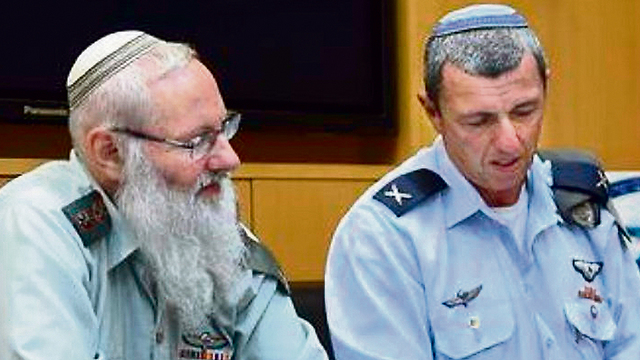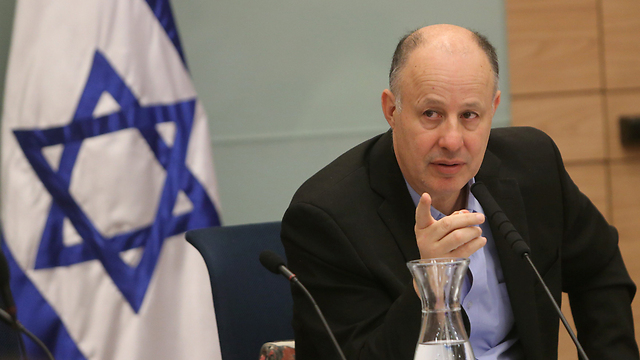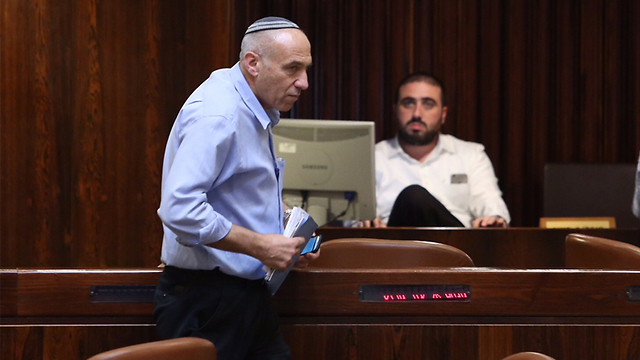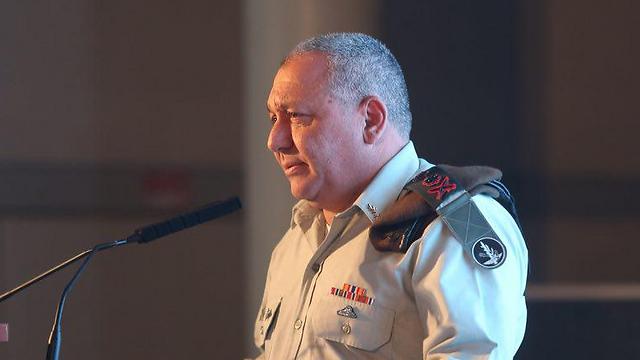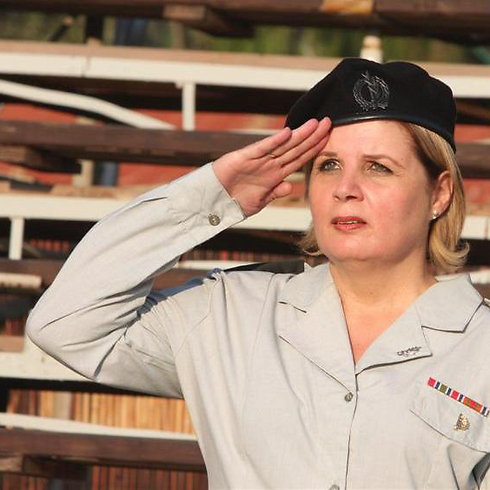
IDF's next chief rabbi praised despite controversy
Some of Colonel Eyal Karim's former colleagues and fellow officers have misgivings about some statements the rabbi has made, but virtually all praise his character and overall conduct.
When IDF Chief of Staff Gadi Eisenkot okayed the appointment of Col. Eyal Karim as the chief military rabbi, there were no cries of joy in the family's Jerusalem home. Karim's family members settled for reserved joy mixed with sorrow over the storm that broke out on the front pages of newspapers across the country. The controversy was defined as a misunderstanding on the difference between halachic (Jewish legal) sophistry and the real world.
How symbolic that the rabbi, whose appointment was nearly cancelled for his answers to halachic questions, called "she'iltot," lives on Jerusalem's Ba'al ha-She'iltot ("Master of the She'iltot") Street.
Karim, 59, is married to social worker Vered and a father of six. His mother, Shoshana, a bibliotherapist, and his father, Avraham, a business owner, live in the same house in Givatayim where he grew up. His mother answers the phone, says thank you for the good wishes, and when asked how she is feelings in the wake of the saga over recent days, she hesitates for a moment before giving her one-word answer: "Fine."
Then she softens slightly and talks about her son, Eyal: "He studied at a state-religious school and went to the Bnei Akiva religious youth group. A normal kid of the religious-Zionist sector. He graduated from the Nachalim Yeshiva and was drafted to the Paratroopers, where he even served as the commander of (its) reconnaissance unit. We're very proud of our children. It really hurt us when they slammed Eyal and us in the papers. He doesn't deserve it. I'm happy that now everything is behind him, and now, if you excuse me, we decided that we're not going to speak with the media."
The rabbi's daughter, who answered the phone at his house, also hurried to say that they weren't speaking with the press.
Dr. Ayala Glicksburg, an expert in gender studies at Bar Ilan University and the wife of Givatayim's chief rabbi, knows the family well. "They belong to the Karlin-Stolin Hasidic dynasty. A cultured, pleasant family with public awareness. They have a small synagogue inside the house. Rabbi Eyal Karim is a role model. He's got a mix of everything that Israel needs today: he's both a scholar and a warrior. It's too bad that they gave him such a shaming," she said.
Until recently, Rabbi Karim himself was not convinced that he would get the job. Just a year and a half ago, he was considering discontinuing his military career. Karim thought that Brig. Gen. Rafi Peretz would continue on in his position as chief rabbi of the IDF for several more years or that he would be replaced with a political appointment.
He pondered the matter by himself and with friends. He wondered if it wasn't time that he got back to his pupils at the Ateret Cohanim yeshiva, which he left some 12 years previously when he returned to the IDF at the request of the then-military chief rabbi, Brig. Gen. Avichai Rontzki.
Karim phoned Maj. Gen. (res.) Yoram Yair – known by his nickname Yaya - and shared his uncertainty. After all, it was Yaya who got him back to the IDF in the first place, shortly before the first Lebanon War, when he appointed him the operations officer of a Paratroopers' brigade, of which Yaya was in command. Yaya reassured him and told him that he believed that the IDF higher-ups would continue the tradition of appointing military rabbis who had previously been combatanats, like Rabbi Rontzki and Rabbi Peretz, who was a helicopter pilot, and therefore Karim should stay in the army and put himself forward for the position.
Maj. Gen. Yair turned out to be correct. The IDF chief of staff decided to appoint Karim, and the official announcement was released. Congratulations streamed in, and then the ground beneath his feet split open.
Permission to launch
Karim enlisted in the Paratroopers' 202nd Battalion in August 1975. Minister Tzachi Hanegbi was in the same platoon. "We were together during the 14 months of training," said Hanegbi. "24 hous a day with 30 other guys, so you definitely can figure out a person.
"Every platoon has a mix of people from all across Israel, and it was the same for us, but one thing that I particularly remember that always made me respect him: He was the only religious man in the platoon and maybe the company. There were barely any religious paratroopers, and he suffered more because of it, as it meant getting up before everyone to be able to pray. It meant that after night training, exhausted, you have to give up 20 minutes of precious sleep in the morning and go pray. It always amazed me. I remember that when we woke up, we always found him wrapped in a prayer shawl and tefillin, in the corner of the tent in winter or outside in summer, praying. And not only that. Sometimes, after operations, when they would give us a short furlough on Saturday afternoon, he had to stay alone in the encampment. Today, it's a lot more common in every unit as there's a larger number of observant soldiers, but then it was unusual."
What kind of a soldier was he?
"Mentally strong, the kind that motivates others, completely fair. I don't think he was ever punished during the training. Throughout the years, I heard through our network of alumni paratroopers of his progression up the ranks, and I wasn't surprised."
And what do you think about his troublesome rulings that have recently come to light?
"I reject every one of the statements attributed to him. It's good that he clarified that he doesn't hold those positions, because those positions are from the Dark Ages. The Torah was written thousands of years ago, and it's not necessarily appropriate for soldiers in the 21st century. But I have no doubt that he's a mentally strong, reliable and honest individual and a leader worthy of senior positions."
Indeed, his military career is impressive. After serving as a platoon commander for recruits and a company commander in the 202nd Battalion, Karim took an unpaid sabbatical to study at the Mercaz HaRav Yeshiva. He then returned as the operations officer for the Paratroopers' Brigade, and his progress continued: He became a commander in the elite Sayeret Matkal unit and then the commander of the Paratroopers' special forces reconnaissance unit. After he left the IDF again, he was ordained as a rabbi and headed the pre-army preparatory course at the Ateret Cohanim Yeshiva.
At the same time, Karim served as an operations officer in reserves for the 98th Division, the elite Paratroopers' unit. MK Moti Yogev, himself a colonel in reserves, knows Karim from their time together in the Paratroopers. Six months ago, Karim even danced at the wedding of Yogev's daughter.
"Anyone who says that his rulings are dark doesn't understand how much he did for the army and how he always found ways to permit things that others might have forbidden," said Yogev. "During his time as the head of the Rabbinate Department, there was an unprecedented number of conversions in the IDF. I remember a question that was sent to him by a religious soldier: Is it permissible to take a dog from Oketz (the IDF's special forces canine unit) to the veterinarian on Shabbat. The rabbi ruled unequivocally yes, and in his ruling compared the dog to a night-vision device that if it were to break down, might endanger someone's life, so it's required to fix it, even on Shabbat."
Yogev recounted a little-known story that happened eight years ago. Israel was about to launch a rocket into space, and it turned out that that the launch process was expected to last into Shabbat. If that weren't enough, two holders of central roles in the project were ultra-Orthodox, "geniuses that were taken from the yeshivas and converted to the Space Agency," as Yogev put it. "They said that they were not willing to violate Shabbat. This meant that the launch would not happen, and the damage would be momentous. They called Rabbi Eyal.
"He went to the two ultra-Orthodox men and asked who their rabbi was. One of them answered that his rabbi was Rabbi Yitzchok Zilberstein, one of the greats of the ultra-Orthodox religious authorities, and the other said that his rabbi was Rabbi Shlomo Amar, then the Sephardic chief rabbi, also one of the great religious authorities.
"Rabbi Eyal spoke to Rabbi Zilberstein at 11pm, explained to him the importance of launching the rocket, and got his permission to violate Shabbat. At 7am, he spoke to Rabbi Amar, and also got the necessary permission from him. Both of them in writing. He showed the two letters to the two ultra-Orthodox guys in the Space Agency, and they did their duty. The launch took place and violated Shabbat, with the rabbis' permission."
The former head of the IDF Manpower Directorate and current MK Elazar Stern (Yesh Atid) also sings Karim's praises, both as a paratrooper and as a rabbi. "It's only because of him that the burial of non-Jewish soldiers next to Jews was made possible," said Stern.
But Karim has made controversial statements on this topic—non-Jewish soldiers—as well. For instance, when a soldier asked Karim if it's permissible to wash dishes on Shabbat, Karim answered that there are enough gentile soldiers in the IDF who can be tasked with doing so. "Dish washing should be permitted on Shabbat by the hands of a gentile soldier, otherwise it may be difficult to clean (these dishes) when Shabbat ends," wrote Rabbi Karim in a book he wrote.
It turnes out that the rabbi also received questions from female soldiers. Here, he showed a softer side. He was asked about women serving in special, classified IDF positions, and ruled that they should be allowed to do so due to the importance of such service to the IDF and the State of Israel.
Rabbi Karim also, in practice, permitted women to sing in public—a controversial topic that is generally forbidden by religious edicts—when he ruled that, in an official state ceremony, soldiers must not leave the room even if a female singer were to go up on stage. An exemption may be requested for smaller ceremonies, but if such exemptions cannot be granted, the soldiers must stay in their seats and occupy their minds with other matters.
When asked whether it was permitted for a male commander to brief a female soldier alone in a room, Karim wrote, "Since an aperture that's open to the public spares us from prohibited seclusion, and a closed but unlocked door is considered an aperture that's open to the public in the minds of many rulers, it is permissible for the department head to interview or judge a female soldier even when they are alone in the room, as long as these actions are taken while there are passersby in the vicnity of the room."
When asked whether an officer leaving the Nabi Musa encampment at night is allowed to drive a female soldier to Jerusalem, Rabbi Karim wrote, "During the day, an officer may drive a female soldier in his vehicle from the encampment at Nabi Musa to Jerusalem. At night, when there is a battalion in training at the encampment, the officer may drive the female soldier in his vehicle, but he must turn on the vehicle's internal light until they reach Jerusalem, in places and time where turning on this light does not put the vehicle at risk of a terrorists' ambush."
Maj. Gen. (res.) Orna Barbivai, the first woman to hold the rank of major general in the IDF's history, was head of the Manpower Directorate while Karim was a high-ranking member of the Military Rabbinate.
"I am certain that the chief of staff had the needs of the IDF in mind and that he examined all aspects, including the integration of women, and if he decided to appoint Rabbi Karim—I trust him," she said.
The chicken proverb
Maj. Gen. (res.) Yom-Tov Samia, who was appalled by the past rulings of Karim's that came to light after his appointment was announced, called him last Tuesday.
"I wanted to find out whose order outranks the other—that of the commander or that the rabbi," he said. "This was his answer, 'If a soldier is given an order that contradicts a religious matter, I would advise the soldier to try and convince the commander (against it), and if that fails—the military command takes precedence. Unequivocally.' After that conversation I was convinced that he understands the military hierarchy. I was not his direct commander, true, but even back then, in the Paratroopers, he was known as a quality officer."
One of the people who has stood by Karim since the media storm broke out is former IDF chief rabbi Avichai Rontzki. "I brought him back to the military because he embodies the combination that I believe in with all my heart—his service as a combat officer and his being a student of the Torah," he said,
"Only those who were forged in combat service can issue lenient rulings. Just recently, I permitted a combat officer, who hadn't been home for three weeks and hadn't seen his wife and children, to ride in a vehicle on Shabbat to get home. So yes, the halacha forbids the desecration of Shabbat, but in this case the fact that the officer wasn't home for a long period took precedence. We need to let Rabbi Eyal do his job. He'll be great."
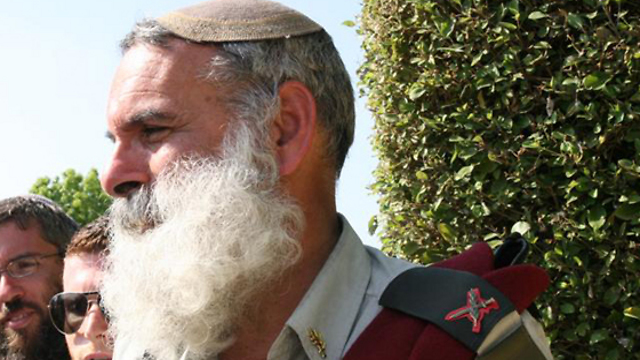
But he has also said really controversial things, about gay people for instance, that they're sick. Do you think this as well?
"Three of my students at the yeshiva confided in me that they were gay. I hugged them. They themselves said that they went through a long therapy process. Those who are not versed in the halacha can't understand that you cannot permit what the halacha forbids."
Can he say that it's permissible to kill a wounded terrorist?
"That's a mistake. He shouldn't have said it. He was contemplating a question sent to him, and I offer this general advice—wise people should be carful with their words."
Have you told him what you think of his rulings?
"Of course. I spoke to him at length and told him that some of his statements should not have been made. How can he even say that women can't give testimony because they're sentimental? I rebuked him and told him that was stupidity. True, the halacha forbids women from giving testimony. So what? I was operated on by a brilliant female surgeon who saved my life, so why can't she give testimony?"
What did he say?
"He stayed silent. Didn't answer. He understands I'm right (on this). But I also understand how he stumbled—you're being sent 200 questions and people want quick answers and that's how you fall, especially when he's not allowed to explicitly say that the halacha is wrong. But you need to find a way of bridging the halacha and the real world, and he will do it. He's a strong man, a real fighter."
Maj. Gen. (res.) Gershon Hacohen supports Karim's appointment. "Rabbi Eyal is very well suited for the position, since he's both a Torah scholar and a fierce warrior. As a yeshiva graduate, I promise you that you won't find a rabbi who says he's for gays or for the desecration of Shabbat. The halacha forced their hands, but the more clever among them find ways of permitting things. I'll tell you a true story: A woman came to the rabbi with a sick chicken and asked whether it was kosher. The rabbi's wife took her in to meet the rabbi, who glanced at the chicken and said, 'kosher.' When the woman walked out, the rabbi's wife asked him, 'how did you permit that? Did you look at the chicken's gizzard, which is what shows whether the chicken is sick or not?' The rabbi answered, 'did you check when was the last time that woman ate chicken?'"
"A rare kind of person." That's how Maj. Gen. (res.) Yoram Yair defines Col. Karim. "I remember him during the first Lebanon war, when he was my operations officer. Calm, cool-headed, and thoughtful. When I see the onslaught he's facing I can't help but think there's someone behind the attacks on him. Maybe there are those who want the Military Rabbinate to go in different directions. Sadly, he's being blamed for the rise in religious extremism, and it's unjustified. I am proud of the chief of staff, who did not heed the calls to cancel the appointment. Karim will be an excellent chief military rabbi."










